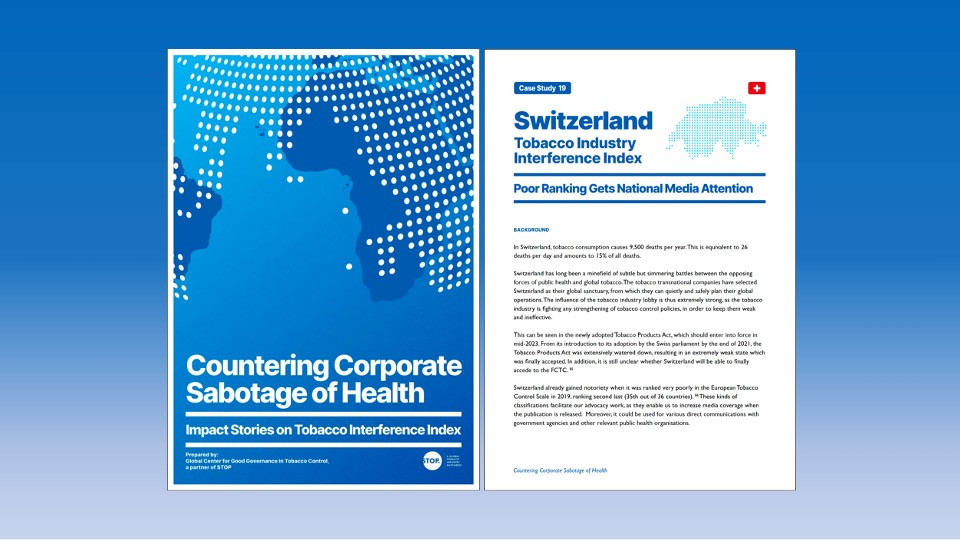Switzerland’s Poor Ranking Gets National Media Attention

“The media has accurately called Switzerland, “The fogged land”,[i] a rather strong description of the country as being shrouded in a smoky fog caused by the tobacco lobby, which bewilders the public and politicians.”
Luciano Ruggia
Directeur AT, Swiss Association for Tobacco Control
Background
In Switzerland, tobacco consumption causes 9,500 deaths per year. This is equivalent to 26 deaths per day and amounts to 15% of all deaths.
Switzerland has long been a minefield of subtle but simmering battles between the opposing forces of public health and global tobacco. The tobacco transnational companies have selected Switzerland as their global sanctuary, from which they can quietly and safely plan their global operations. The influence of the tobacco industry lobby is thus extremely strong, as the tobacco industry is fighting any strengthening of tobacco control policies, in order to keep them weak and ineffective.
This can be seen in the newly adopted Tobacco Products Act, which should enter into force in mid-2023. From its introduction to its adoption by the Swiss parliament by the end of 2021, the Tobacco Products Act was extensively watered down, resulting in an extremely weak state which was finally accepted. In addition, it is still unclear whether Switzerland will be able to finally accede to the FCTC.[ii]
Switzerland already gained notoriety when it was ranked very poorly in the European Tobacco Control Scale in 2019, ranking second last (35th out of 36 countries).[iii] These kinds of classifications facilitate our advocacy work, as they enable us to increase media coverage when the publication is released. Moreover, it could be used for various direct communications with government agencies and other relevant public health organisations.
Advance Tobacco Control Policy through Media Advocacy
The publication of the Global Tobacco Industry Interference Index (GTI) came at the right time, during the “children without tobacco” campaign to ban tobacco advertisements aimed at minors. The vote was passed on February 13, 2022. [iv] The results of the GTI played an important role in garnering support for the campaign. Within the first week of its release, a media wave presented the appalling results of Switzerland in the GTI, making the public aware of the strong tobacco lobby present throughout the government system.
The media and journalists publicised the rankings and classifications of the countries through “name and shame” articles. Such classifications that compared us to other countries, enabled us to contact journalists in advance to elevate our arguments. This preparation process was crucial and the provision of preliminary results, gave us enough time to contact, meet with, and discuss the topic with key journalists. This proactive approach in contacting several journalists, allowed us to ensure that a selection of newspapers would publish an article on this exclusive information.[v] Moreover, we were able to broaden the reach by translating the Swiss Index, and issuing a press release in all 3 national languages.
A media analysis showed that within the first week, more than 60 online, print articles and radio-contributions were published on the Swiss results in the GTI. The media outlets covered a range of local news, such as Zürichsee Zeitung, and numerous nationally distributed news outlets, including Aargauer Zeitung, Tages Anzeiger, Der Bund, and SRF. Additionally, an important German newspaper, Die Zeit, ran a 2-page article on the tobacco lobby in Switzerland and the WOZ, a left-winged Swiss newspaper, published an interview with Kris Schürch from the Swiss Association for Tobacco Control.
The Die Zeit article referred to, Switzerland as “The fogged land”, a strong title describing the country being shrouded in a smoky fog caused by the tobacco lobby, which bewilders the public and politicians.
In the short-term, the effect of the GTI release was significant. It provided a conducive environment when the tobacco advertising ban directed at minors was being considered. The long-term results cannot be fully measured yet. However, it is clear the index and Switzerland’s poor ranking is still being picked up in the media. More importantly, the ranking can still be used as a reference in the future.
About Swiss Association for Tobacco Control: The Association was founded in 1973 as an umbrella organization to promote non-smoking and today has over 50 collective members. These include national and cantonal health leagues, organizations from the public and private health sector, and cantonal departments
[i] AT Schweiz. Global Tobacco Industry Interference Index. Available from: https://bit.ly/3N3NKKi
[ii] AT Schweiz. No ratification of the FCTC. 29 September 2021. Available from: https://bit.ly/3O3oG7x
[iii] AT Schweiz. Tobacco Control Scale. Available from: https://bit.ly/3MV4Qdf
[iv] AT Schweiz. Die Schweiz sagt «JA» zum Schutz der Kinder und Jugendlichen vor Tabakwerbung. 13 February 2021. Available from: https://bit.ly/3Qs4r5a (available only in German, French and Italian)
[v] AT Schweiz. Global Tobacco Industry Interference Index. Available from: https://bit.ly/3N7ZXOo
